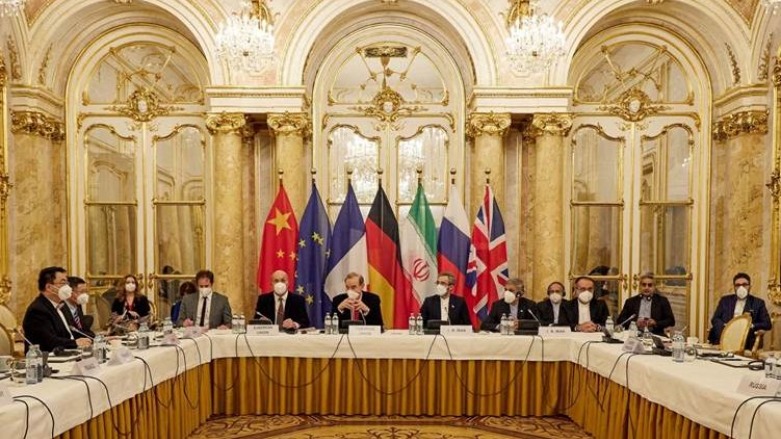US continues to blame Iran for stalemate on nuclear deal—but still willing to conclude agreement

WASHINGTON DC, United States (Kurdistan 24) – The State Department’s Principal Deputy Spokesperson Vedant Patel affirmed to journalists on Thursday that a text for reviving the 2015 Iranian nuclear deal, known formally as the Joint Comprehensive Plan of Action (JCPOA), existed and that the US and its European allies had accepted it. They are waiting however, for Iran to do the same.
That has long been the US position. It remains unchanged, despite the US disclosure on Wednesday that Iran had plotted to kill two former US officials: John Bolton and Mike Pompeo.
Read More: Iran plotted to assassinate Bolton, Pompeo
Moreover, Israeli Defense Minister Benny Gantz charged on Thursday that Palestinian Islamic Jihad (PIJ) ,with which Israel fought a three day battle last week, “is a violent Iranian proxy.”
The US does not dispute Gantz’s characterization. But nothing—not the Iranian assassination attempts, nor its support for terrorist proxies—seems to change the US position.
“We believe the best path” to ensure that Iran does not gain nuclear weapons “is through diplomacy,” Patel said. “As long as we believe pursuing a JCPOA is in U.S. national security interest, we’re going to continue to do so.”
Renewing the JCPOA: Iran is Responsible for Stalemate
“We and the Europeans have made quite clear that we are prepared to immediately conclude and implement the deal we negotiated in Vienna for a mutual return to the full implementation of the JCPOA,” Patel explained. “But for that to happen, Iran needs to decide to drop their additional demands that go beyond the JCPOA.”
The negotiations, mostly conducted in Vienna, have been stalled since March, as Iran insisted on two extraneous conditions. One was that the current US administration commit future administrations to a renewed deal, so a future president could not leave it, as Donald Trump did.
However, that would only be possible, if the agreement were in the form of a treaty—which requires approval by two-thirds of the US Senate. But the JCPOA is not popular in Congress, and it would be impossible to get such approval. So it is a condition that the Biden administration cannot meet.
The second condition demanded by Tehran was that the US remove the Islamic Revolutionary Guard Corps (IRGC) from its list of terrorist groups and lift sanctions on it. America’s lead negotiator, Robert Malley, who had negotiated the original deal during the Obama administration was agreeable. The White House, however, refused.
Two Last Ditch Efforts
The European Union (EU), nonetheless, did secure a new session of talks in June. They were moved to Qatar from Vienna, as if a shift in venue might make a difference. However, nothing changed, and the talks quickly ended in failure:
Read More: Iran nuclear talks end after just two days, as doubts grow about effort
As Malley subsequently explained, the EU "wanted to try one more effort, at least one more effort” to secure an accord. But it proved not to be the EU’s last effort. A second “last ditch” attempt was made. It began a week ago Thursday, and it ended on Monday—without agreement.
Read More: EU-sponsored Iran nuclear talks end, again, with no agreement
In the latest round of talks, Iran dropped its two earlier conditions, but it added a third: the International Atomic Energy Agency (IAEA) should end its inquiries into Tehran’s efforts to hide aspects of its nuclear program. But Washington cannot accept such a demand, so, once again, the talks are stalled.
New Issue: Assassination Plots
Some commentators believe that the revelation of Iran’s assassination plots should end any US willingness to renew the JCPOA. That certainly includes John Bolton, Trump’s first National Security Adviser, who denounced Iran’s rulers as liars, terrorists, and enemies of the United States,”who simply cannot be trusted.”
Such commentators also include the conservative Washington Times which reported, “Not even a plot to assassinate former top U.S. officials on American soil will derail the Biden administration’s push for a renewed nuclear deal with Iran.”
The more liberal Washington Post ran a Bloomberg opinion piece, “Bolton Plot Should be a Warning on Iran Nuclear Talks.”
The position of the Biden administration, however, is that a renewal of the JCPOA is separate and distinct from all other issues, even though, were it to be revived, it would provide Iran with access to billions of dollars in oil revenues and frozen assets.
New Issue: Support for Palestinian Islamic Jihad
Israel fought a three-day battle last week—between Friday and Sunday—against Palestinian Islamic Jihad (PIJ.) In those three days, the terrorist group fired nearly 1,200 rockets and mortars at Israel.
How is that possible? PIJ is supported by Tehran.
“The Iranian ayatollahs are involved on this front,” Israel’s Defense Minster stated on Thursday. “Islamic Jihad in Gaza is a violent Iranian proxy.”
Gantz charged that Iran provided PIJ with “tens of millions of dollars” each year. “Their leadership visits Iran and meets Iranian leaders frequently,” he continued. “Islamic Jihad has an open tab in Iran.”
The same might be said about several Iranian-backed militias in Iraq.
Kurdistan 24 asked Patel if the US agreed with Gantz’s characterization of PIJ. He responded with a tepid call on Tehran to reduce support for such groups.
“The United States is under no illusions about Iran’s destabilizing activities throughout the region,” Patel said. “If Iran wants to show it can be a responsible actor, now is the time for it to play a constructive role in the region.”
That position seems unlikely to have much impact in Iran, however, unless it is stated more clearly, and forcefully, and it is backed by concrete measures.
